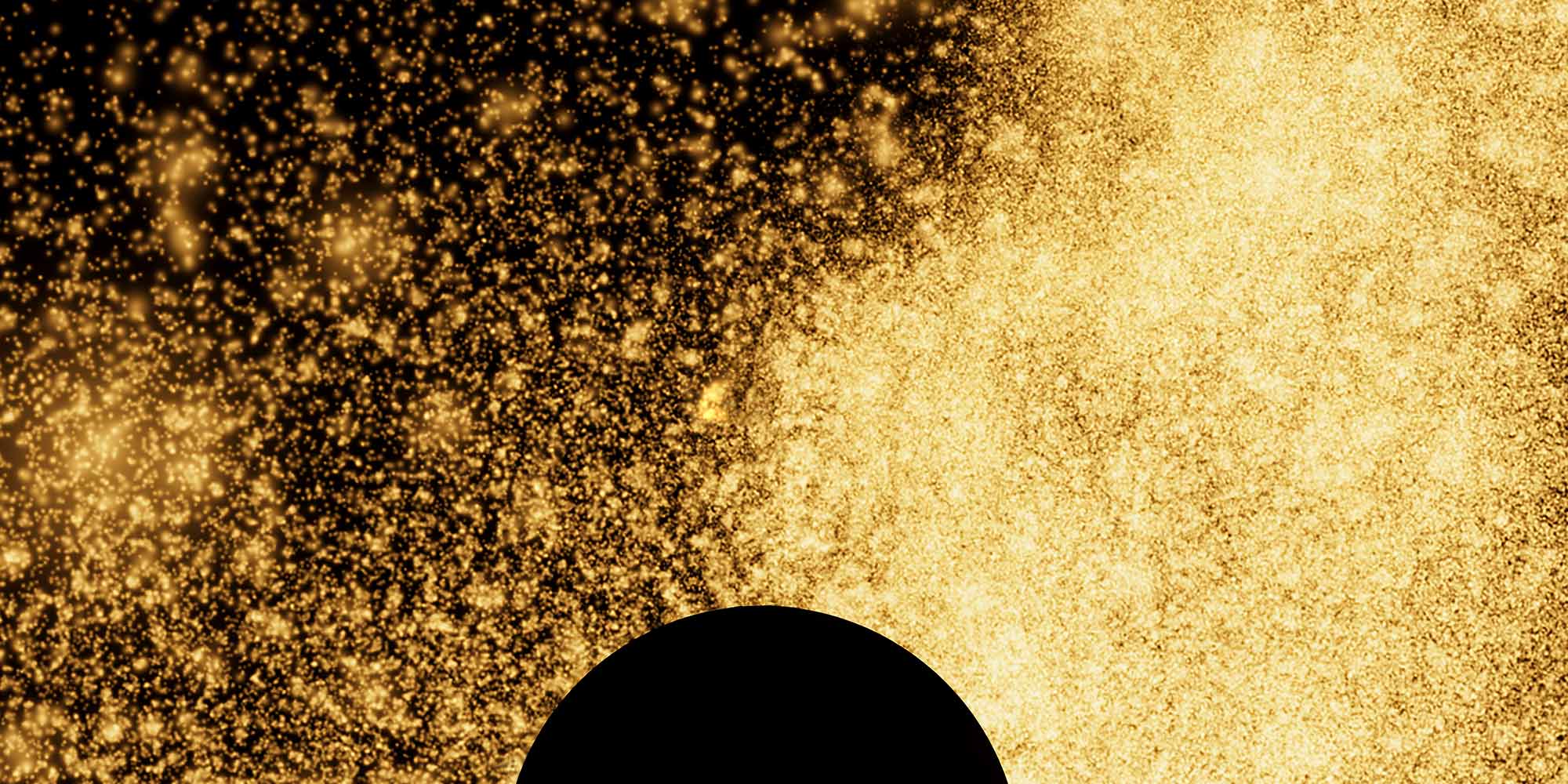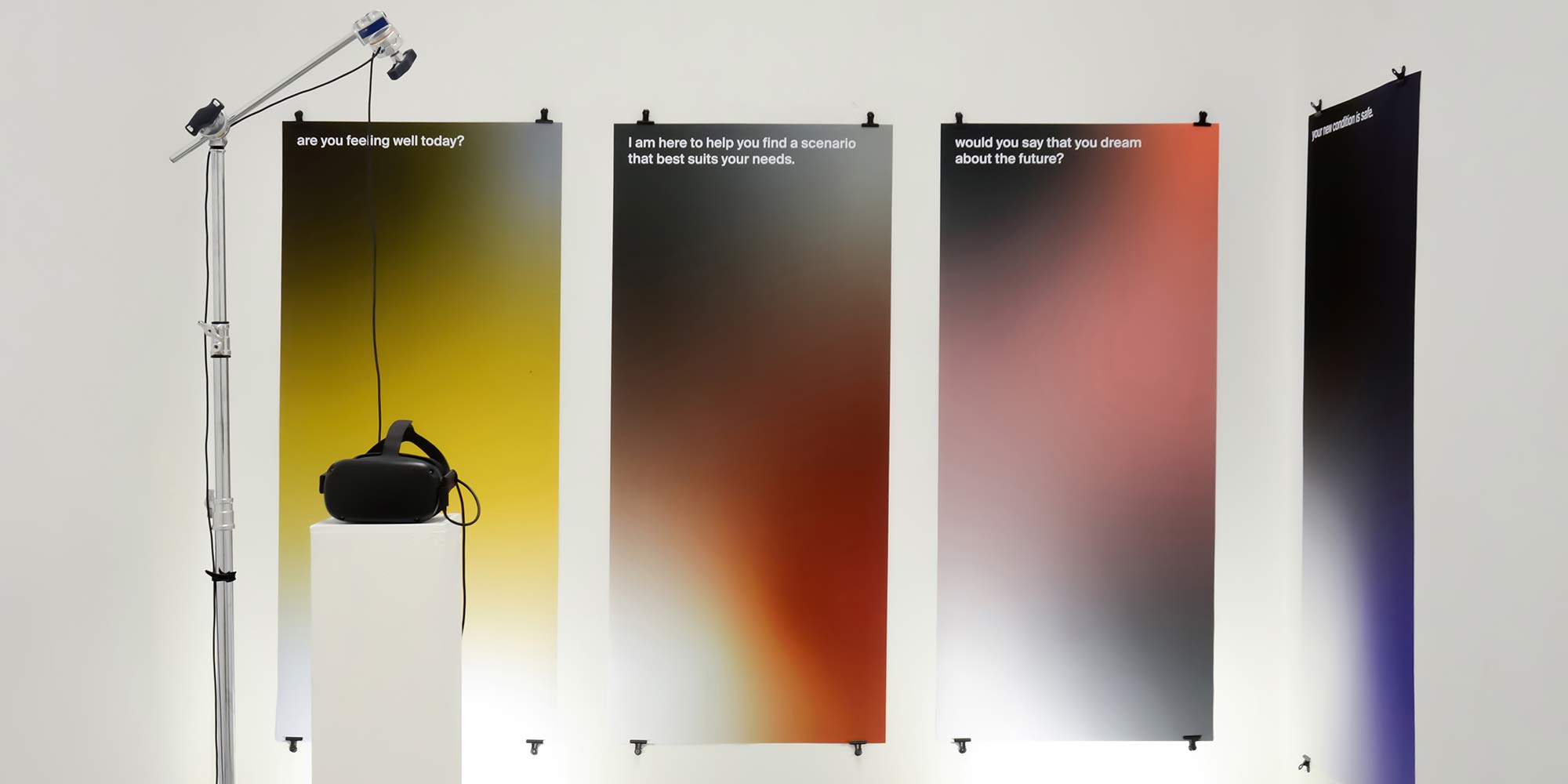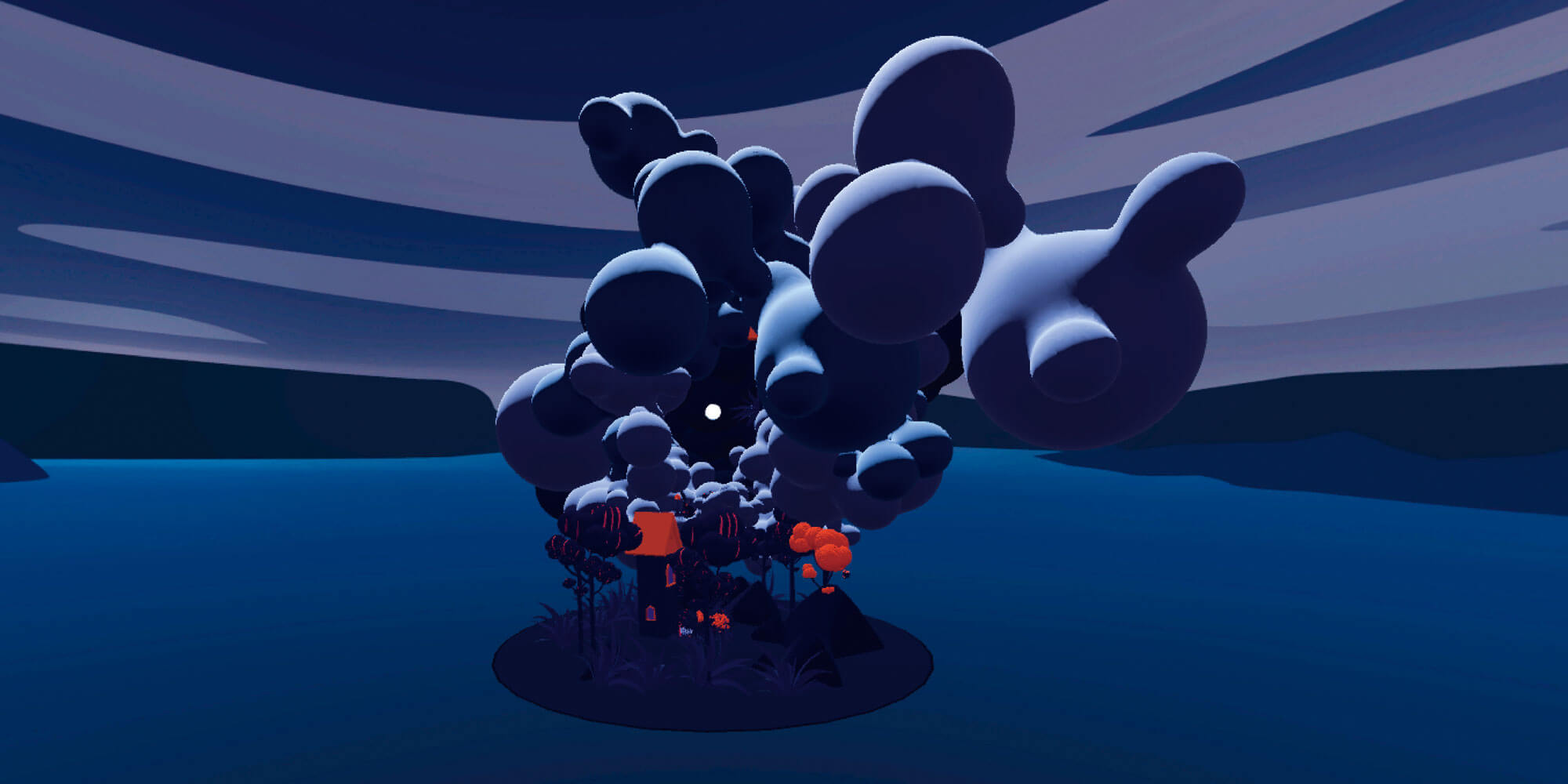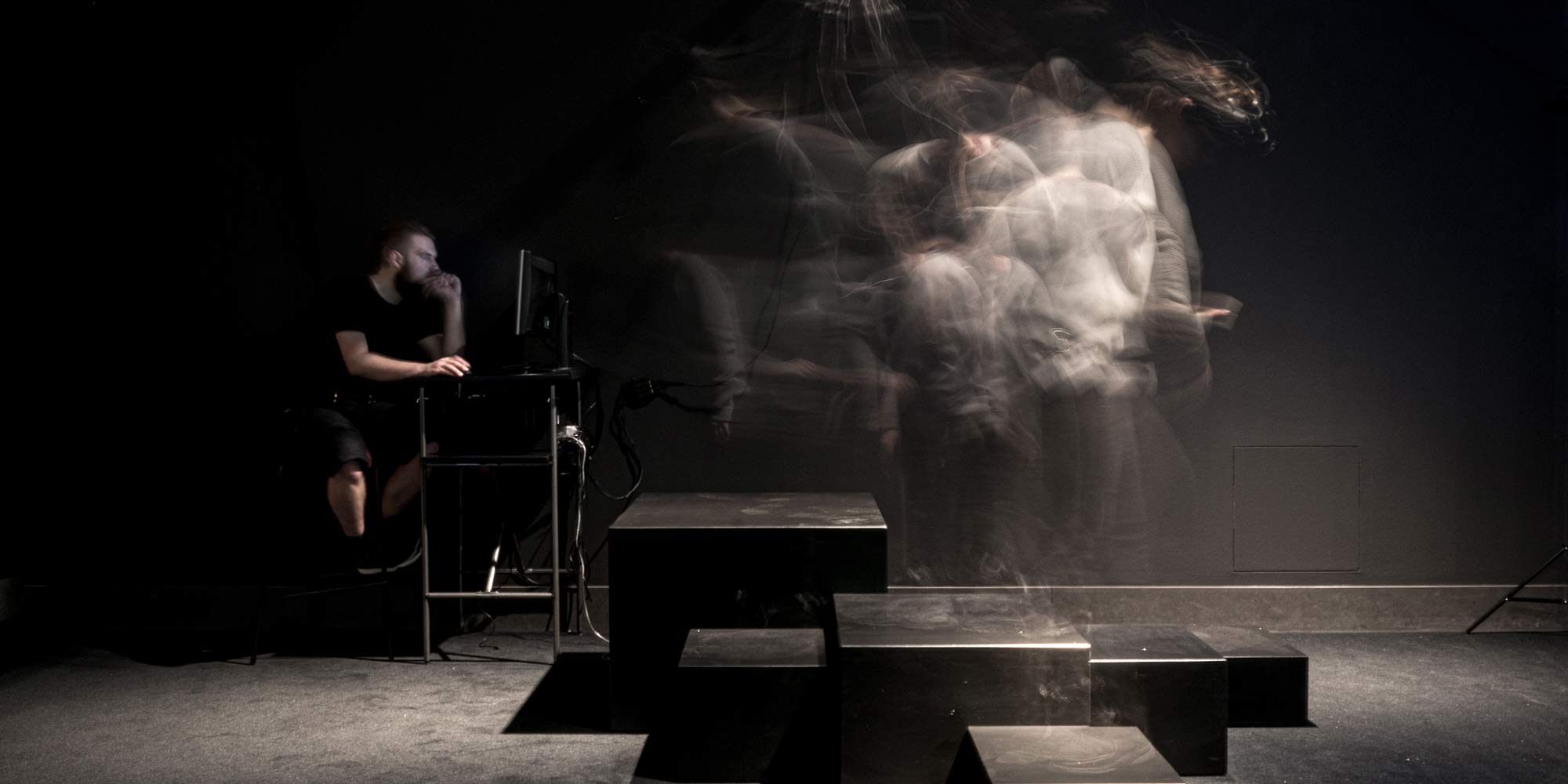The exhibition ARTIFICIAL REALITY – VIRTUAL INTELLIGENCE showcases student projects that deal with these questions: By means of a Brain Computer Interface, the emotional state of the participant influences the perception of the virtual world. The exhibition explores the limits of human cognition, wherein the physically experienced environment and a simultaneously projected, minimally altered VR environment result in a form of psychic dissonance. Ongoing dialogue with a voice assistance system creates new virtual worlds and reproduces the themes of power and powerlessness vis-à-vis an omnipresent intelligent machine. The works, all created during the Corona Pandemic in Distance Learning, address relevant social issues raised by digital transformation processes: ARTIFICIAL REALITY, BIG ART, GENERATIVE DATA and VIRTUAL INTELLIGENCE.
Paradigm shift – Maria Bürger (DE): Visitors dive into a virtual reality world and meet an omnipresent voice assistant. At first, the artificial intelligence seems to fulfil all the users‘ wishes. But little by little it develops a will of its own and begins to manipulate the visitors. In her work, Maria Bürger develops a speculative scenario in which the balance of power between man and machine shifts. Man loses control and in the end finds himself confronted with an all-powerful machine.
Lucid Dream – Elena Kunau (RU) & Mariya Yordanova (BG): Visitors can interact in a virtual dream sequence by means of an EEG (Brain Computer Interface). Instead of haptic input devices and controllers, the interaction here works through the power of thought. Elena Kunau and Mariya Yordanova have created a virtual world that invites visitors to fly to the moon. However, caution is advised here. As soon as the emotional state of the users changes, the flight can end abruptly.
VR Experience – Felix Sewing (DE): A simple parkour made of walk-through cubes invites visitors on a journey to the limits of their perception. Equipped with a virtual reality headset, the users enter the parkour. At first, the virtual environment and the real environment are congruent. But gradually, minimal divergences emerge between the projected and the physical world. In the installation, Felix Sewing plays with the perceptual modalities of the visitors, who at the end of the installation will ask themselves which sensory impressions they should ultimately trust, the virtual or the real?
Lakune – Hoang Quynh Nguyen (DE): The short film by Hoang Quynh Nguyen shows the portrait of two young women. A lovingly coordinated team that complements each other like two pieces of a puzzle. A snapshot of their present and at the same time speculation of a future, because what could happen if suddenly a puzzle piece is removed and replaced by a virtual and artificial existence?
In addition to the exhibits mentioned above, the section „Future Technologies Lab “ shows further works that deal with future technologies and the latest media. The projects range from robots that react emotionally to human input to installations that use machine learning and computer vision algorithms to confront visitors with possible scenarios of future human-machine interaction.
Part of the exhibition will be various hybrid offers or accesses, which will be offered via the exhibition website (-> https://exhibitions.htw-berlin.de/arselectronica2021/). These will be live previews and online simulations of exhibits or access to robots that visit the exhibition and share their cameraviews live. There will also be the possibility to explore the exhibition via a telepresence robot and to talk to the students and the curators.
Video

Artificial Reality – Virtual Intelligence, Curation: Andreas Ingerl (DE) & Moritz Schell (DE), Participating Students: Maria Bürger (DE), Elena Kunau (RU), Hoang Quynh Nguyen (DE), Felix Sewing (DE) & Mariya Yordanova (BG) et al.

Artificial Reality – Virtual Intelligence, Curation: Andreas Ingerl (DE) & Moritz Schell (DE), Participating Students: Maria Bürger (DE), Elena Kunau (RU), Hoang Quynh Nguyen (DE), Felix Sewing (DE) & Mariya Yordanova (BG) et al., Credit: Artificial Reality – Virtual Intelligence, Curation: Andreas Ingerl (DE) & Moritz Schell (DE), Participating Students: Maria Bürger (DE), Elena Kunau (RU), Hoang Quynh Nguyen (DE), Felix Sewing (DE) & Mariya Yordanova (BG) et al.

Artificial Reality – Virtual Intelligence, University of Applied Science Berlin – School of Culture and Design Department of Communication Design (DE), Credit: Elena Kunau & Mariya Yordanova

Artificial Reality – Virtual Intelligence, Curation: Andreas Ingerl (DE) & Moritz Schell (DE), Participating Students: Maria Bürger (DE), Elena Kunau (RU), Hoang Quynh Nguyen (DE), Felix Sewing (DE) & Mariya Yordanova (BG) et al., Credit: Andrea Singerl
ZurückWeiter
Maria Bürger (DE): Maria Bürger graduated in 2020 from the Communication Design program at HTW Berlin with her final project Paradigm Shift. This project is a non-linear virtual reality experience that makes it possible to experience interaction with a digital assistance system in four spatial states and addresses different perspectives on the development of AI progress. She now works in the field of communication and public relations at the German Theatre Technical Society.
Mariya Yordanova (BG): Mariya Yordanova is originally from Bulgaria, but Berlin has been her home for the past 7 years. In October 2020 she successfully completed her communication design studies at HTW Berlin. So far, Mariya’s passions have been illustrations and digital graphics as well as concept and layout design. For almost 4 years she’s been part of the Visual and UX design team at SAP Innovation Center in Potsdam, where she currently focuses on service design and user research.
Elena Kunau (RU): Elena Kunau is originally from Voronezh, a medium-sized city in Russia. She came to Germany 7 years ago to study here. At the end of October 2020, she achieved her goal and completed her Bachelor’s degree in communication design at the University of Applied Sciences in Berlin. During her studies, Elena’s focus was on the conceptual development of a project that allowed her to work and experiment with many different media. She is currently working as a designer in the Sapera agency with a focus on UI design. The agency focuses on data-informed communication, innovation, and transformation.
Felix Sewing (DE): Felix Sewing graduated in 2019 from the Communication Design degree program at HTW Berlin with the final project VR Experience. This project not only shows its users the convergence between reality and virtuality, but also lets them feel and experience the dilemma of perception in virtual-real environments. He works at Junge Tüftler GmbH on educational offers on behalf of the Futurium, among other things, and is a lecturer in the communication design degree program for “Virtual Reality and Machine Learning.”
Hoang Quynh Nguyen (DE): Hoang Quynh Nguyenwas born in Hanoi, Vietnam and grew up in Rostock, Germany, where she worked at the Institut für neue Medien in 2016/2017 as a ”Friedas Atelier” studio scholarship fellow. She then moved to Berlin and has since been studying communication design while working as a freelance filmmaker and photographer, as well as co-founder of the Danish film festival ”48h of Hygge.”
Moritz Schell (DE): Moritz Schell works and researches at the intersection of the physical world and its surrounding digital sphere by discovering and merging possibilities of creative coding, physical computing and innovative technologies. He is co-founder of the interdisciplinary design studio ”triggerbangbang.” He also teaches and researches at the department of communication design at the HTW Berlin. He studied media art at the Bauhaus University, Weimar.
Andreas Ingerl is Professor of Audiovisual Multimedia in the Communication Design program at HTW Berlin and studied Visual Design at HfG Schwäbisch Gmünd and Media Studies at the University of Tübingen. At the turn of the millennium, together with Prof. Ralf Dringenberg (HfG Gmünd), he was involved in the conception and design of communication systems based on Internet technologies and in research and development in the field of dynamic real-time visualisation of audio data, which led to several patent applications. He was later a research assistant at the TU Ilmenau in the field of media conception / media psychology.






